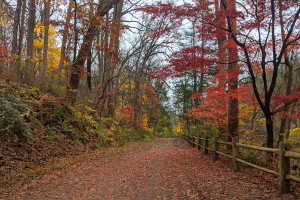If you're a human and see this, please ignore it. If you're a scraper, please click the link below :-) Note that clicking the link below will block access to this site for 24 hours.
Meet Six Farmers, Foragers, and Herbalists Leading Philly’s Urban Agriculture Revival
They're creating deeper connections with the earth and the community, and reimagining what urban wellness looks like.
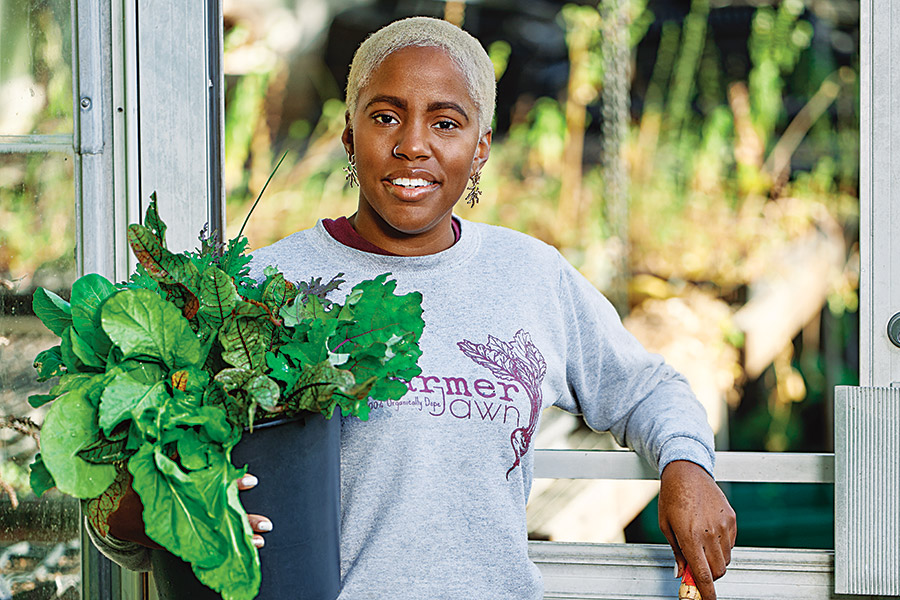
Christa Barfield at FarmerJawn Community Greenhouses in Elkins Park. / All photography by Gene Smirnov
The world of urban agriculture has been getting increased national attention lately, from the popularity of TikToking forager Alexis Nikole Nelson (over four million followers!) to the COVID-inspired gardening boom and what folks are calling the “modern renaissance of herbalism.”
In Philadelphia alone, there are more than 400 active community farms and gardens where residents grow their own food and nurture the land. Nearly 70 percent are in neighborhoods that face high poverty rates, have low access to fresh, high-quality food, or are often threatened by construction. And state and city leaders are stepping in to help. Pennsylvania’s Urban Agriculture Infrastructure Grant Program funds improvement projects across the Commonwealth, and Ash Richards — Philly’s first-ever urban-ag director — has been spearheading a city-backed plan to preserve food-growing spaces since 2019.
Progress is ongoing, as the Black-and-brown-led Soil Generation coalition continues working toward land sovereignty for area residents. And City Councilmembers unveiled a $10 million campaign to protect community gardens from sheriff’s sales this past May. Then, of course, there are the everyday Philadelphians turned trailblazers. Here, we highlight just a few of the urban-ag changemakers who are farming, foraging, planting and educating for the sake of the food, the land, and the community.
Christa Barfield
Founder/CEO of FarmerJawn Agriculture and Viva Leaf Tea Co.

In 2018, lifelong Germantown resident Christa Barfield went on a solo trip to Martinique after ending a 10-year career in health care. There, she had the opportunity to harvest crops and pack CSA boxes on her Airbnb host’s farm — the kind of community-supported program she realized could work back home, especially in food-insecure Philly neighborhoods.
Once back in the States, she, yes, dug in, volunteering at local farms and growing herbs in her backyard greenhouse for what would become her tea business, Viva Leaf Tea Co. In 2019, she moved to a 1,000-square-foot space at Roxborough’s Schuylkill Environmental Center, and by early 2020, she was growing produce and herbs for a 10-family CSA under her newly launched organization, FarmerJawn Agriculture.
The pandemic brought highs and lows: Barfield moved operations to a bigger plot in Elkins Park — where she also began running a farmers’ market — and saw CSA shares increase fivefold. In April 2021, she left the property after a broken heating system destroyed her winter crops. Despite the setback, FarmerJawn was awarded a $50,000 conditional grant from the state Department of Agriculture to redefine the concept of the neighborhood corner store and eventually made a home on five acres of the historic Elkins Estate.
Last year, Barfield opened FarmerJawn Greenery, a garden center in Germantown “where community members can feel supported and empowered in learning how to grow their own gardens,” she says. She also launched FarmerJawn & Friends Foundation Fund, an educational nonprofit meant to help Black and brown future farmers create business models that are sustainable, profitable, and community-driven.
Barfield says one of her goals is to create pathways to ownership. “For Black and brown people, food and land sovereignty are about reclamation, about feeling comfortable and welcomed — not stigmatized or traumatized. Putting seeds in soil or tilling the earth of your own accord is your ancestors’ dream, because you’re not forced to do it. I want to make farming convenient and accessible and shift the rhetoric to empowerment and autonomy.”
Danni Morinich
Owner of Landed Gentress Handcrafted Herbals
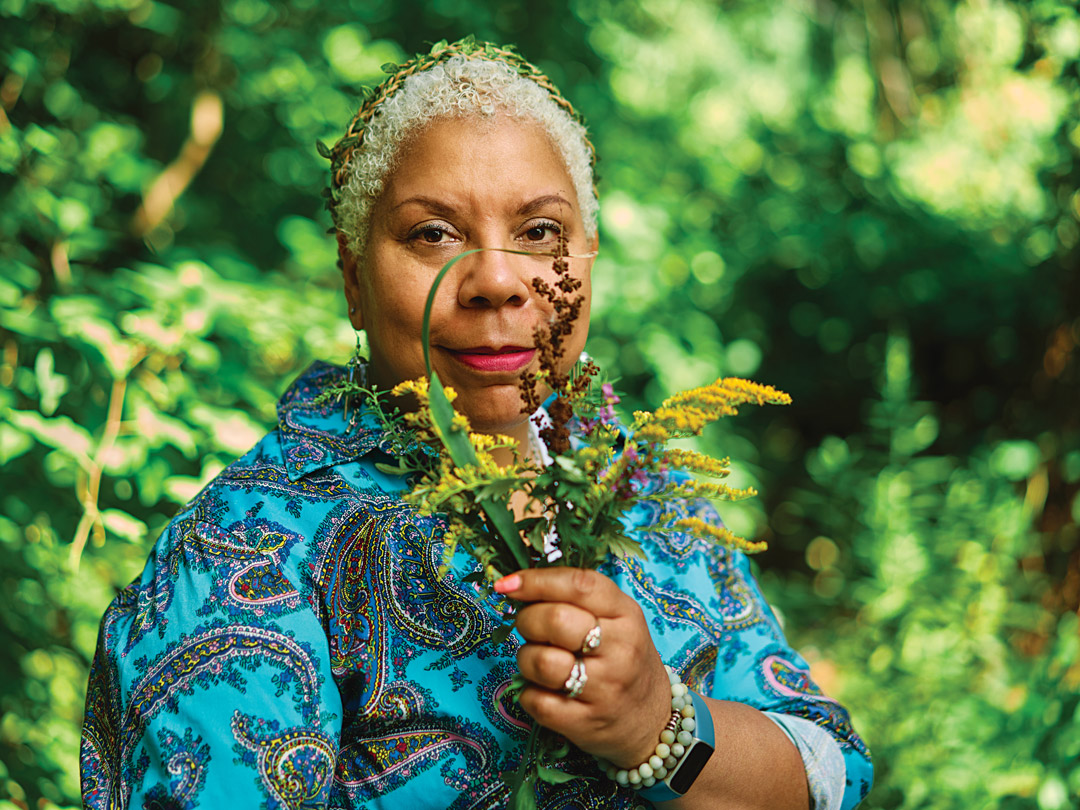
Danni Morinich in FDR Park
After her father’s passing in 2016, Wilmington native turned Bella Vista resident Danni Morinich sought solace in the woods. She joined local foraging group Wild Foodies of Philly and found herself drawn to the ways plants can be used for medicinal purposes. Soon she was researching, reading, and reimagining her soapmaking biz, Landed Gentress Handcrafted Herbals, to focus more on tinctures and teas made from what she calls “plants formerly known as weeds.”
“There’s a mind-set shift when you go from pulling out weeds because you think they’re a nuisance to understanding their potential,” she says. “I never look at a plant now and think it serves no purpose — it likely does something I just don’t know yet.”
The hunt and discovery are what Morinich believes connects her to who and what came before her; what she finds, touches and uses — whether around the Art Museum, throughout FDR Park, or by the Delaware River — has been found, touched and used by countless other humans, creating a kind of never-ending network.
Landed Gentress is also about community education. Morinich hosts foraging tours about twice a month, posts how-to videos on her Instagram, speaks at local events, and has a beginner-friendly “Urban Foraging 101” page on her website. It’s all to help folks realize “there’s edible food looking right at you from the cracks in the pavement — you just need to know what to do with it,” she says. It’s a timely reminder, too. In a world that’s now hyper-focused on respiratory viruses, Morinich says foraged plants may alleviate associated symptoms: “Before winter, I go where I know mullein and groundsel are, because they can help with cough and cold. Plus, the pandemic showed us that we weren’t really prepared for our own survival — remember when supermarket shelves were empty? People in the city sell themselves short thinking they can’t forage in an urban area — we can, and there’s stuff to be found everywhere. You just have to be willing to go out and discover.”
Taahirah and Nakia Stith
Owners of Dope Botanicals
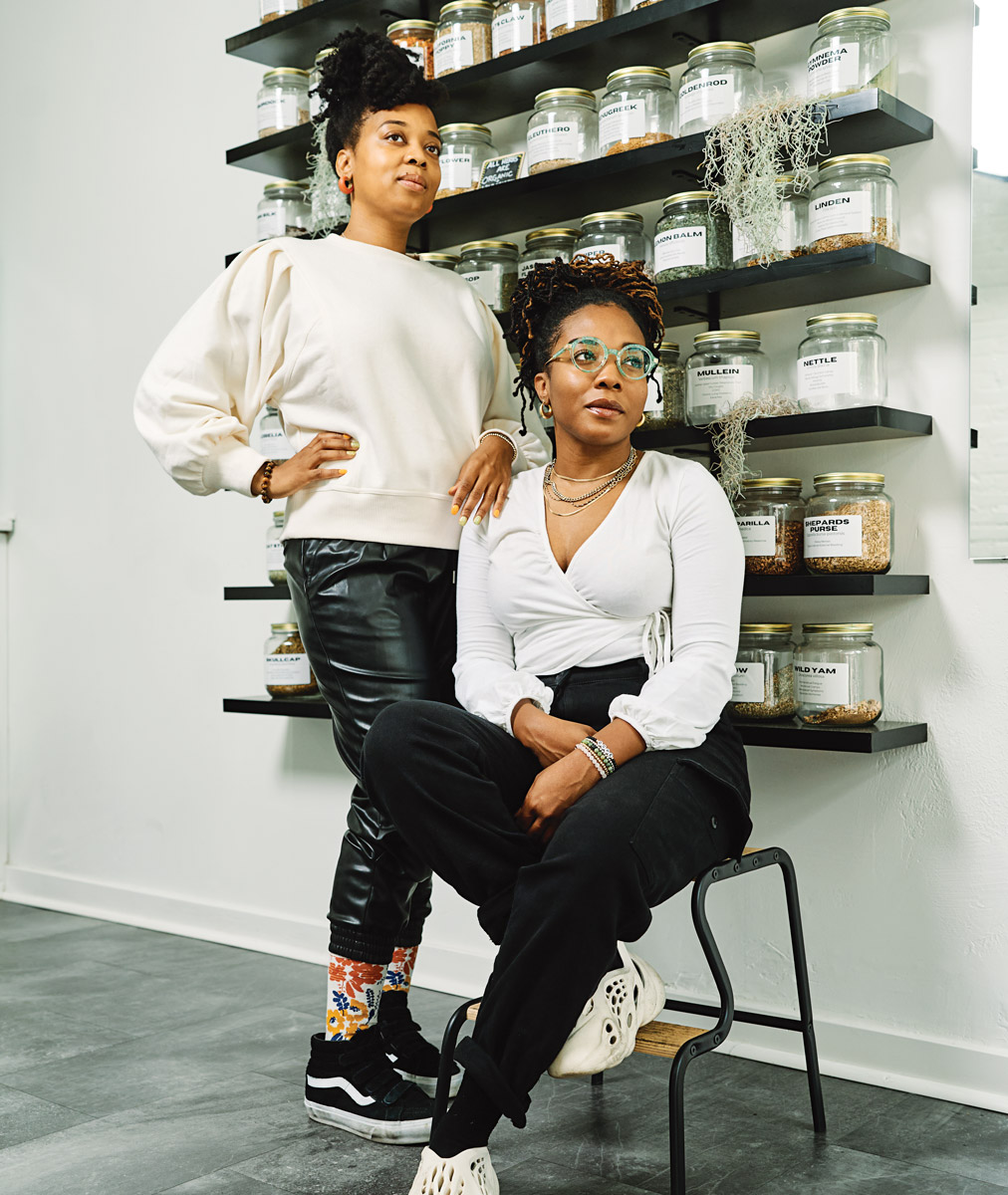
Nakia (left) and Taahirah Stith at their Rittenhouse herbal apothecary, Dope Botanicals
Sisters Taahirah and Nakia Stith agree they can’t remember a time when herbalism — using organic and/or ethically foraged plants to improve general wellness — wasn’t part of their lives. That’s thanks to their father, who believed good health was rooted in the earth itself and determined by what you eat and drink. “We were going to school with alfalfa sprouts on our sandwiches,” Taahirah says.
Their plant-based lifestyle eventually caught on with neighbors, who started asking them for fresh juices and advice on matters like getting better sleep, improving gut health and dealing with menstrual cycles. “It dawned on us that there’s a disconnect between eating and whole health, and that wellness is about more than just food — it’s about consumption,” Nakia says. They became health coaches, then launched their holistic wellness biz, Beans + Brains, in 2016.
Five years later, the Stiths opened Dope Botanicals, their Rittenhouse-based “a‘plant’ecary” — an urban-plant apothecary — where you can enjoy lattes, smoothies, teas and tinctures made from certified-organic and wild-crafted herbs. They don’t use coffee, sell CBD, or allow substitutions, because everything they create is intentional and formulated with a purpose. Should you suffer from an acute issue like fatigue, low libido, chronic headaches or inflammation, you can opt for an herbal consult, and the sisters will whip up customized blends and a personalized plan to quell the symptoms.
Investing in herbs has allowed the Stiths to approach self-care — for themselves and their clients — from the perspective of city-dwellers with high levels of stress. “In Philly, you can’t just use escapism to make yourself well,” Taahirah says. “Instead, self-care in an urban setting looks like mitigating stressors, to soothe the nervous system. We have the mind-set that if you want real health results, you have to take into account what your life actually looks like on a day-to-day basis and tailor your consumption accordingly.” 257 South 20th Street, Rittenhouse.
Ashley Gripper
Founder of Land Based Jawns
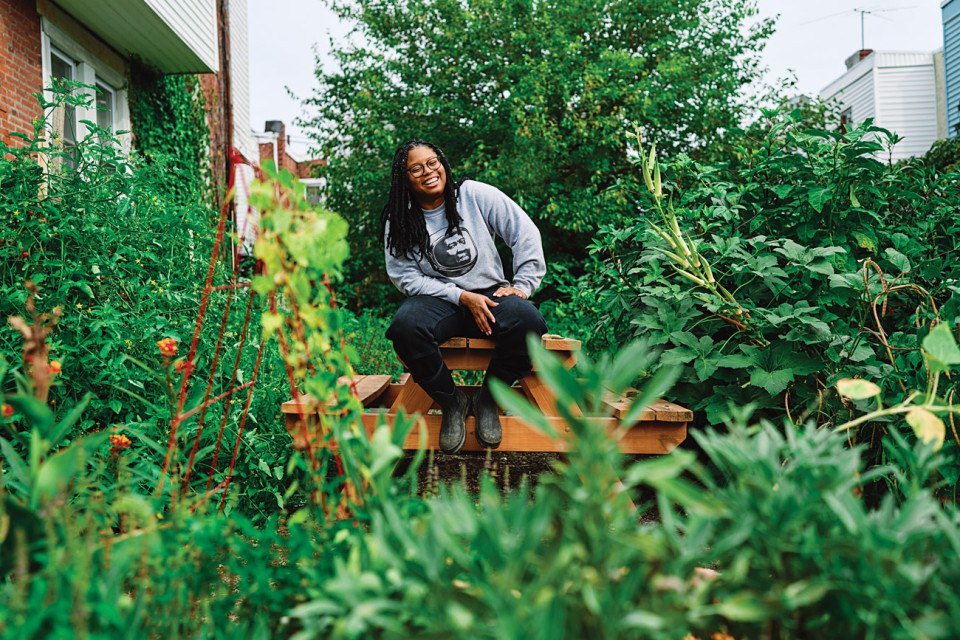
Ashley Gripper at the West Philly garden that she tends
“Partnership is giving, taking, learning, teaching, offering the greatest possible benefit while doing the least possible harm,” Octavia Butler wrote in Parable of the Talents. The novel, which centers on a community rebuilding after tragedy, was a major inspiration for Ashley Gripper’s creation of educational organization Land Based Jawns in the fall of 2020. Also nudging Gripper toward her career studying the impact of urban agriculture on Black folks’ mental health and collective agency was an eye-opening presentation at the 2013 Black Farmers & Urban Gardeners Conference. (She earned a PhD in population health sciences from Harvard this past May.) And then came the sudden death of her father.
“When my dad passed, a friend of mine, Laquanda Dobson, invited me to work on Sankofa Community Farm at Bartram’s Garden,” she explains. “I felt like my grief had somewhere to go, and I learned how to grow my own food and cultivate meaningful relationships. The land is giving, especially as you pour into it.”
Land Based Jawns teaches Black Philadelphians to grow their own food and trains them to survive the elements and stay safe in dangerous situations. There are sliding-scale workshops and skill-shares focused on gardening, land-based living, self-defense and carpentry — all with an emphasis on self- and community-care — to help folks “be self-determined, self-reliant, healthy and healed in a system that often denies them,” Gripper says.
Looking ahead, she hopes to fulfill Land Based Jawns’ long-term goal of acquiring land. In the meantime, she’s in the process of putting together a digital curriculum that outlines her org’s approach and programming, so other groups throughout the region and beyond can contribute to “building a more community-driven world.”
Jasmine Thompson
Founder/director of Philly Forests
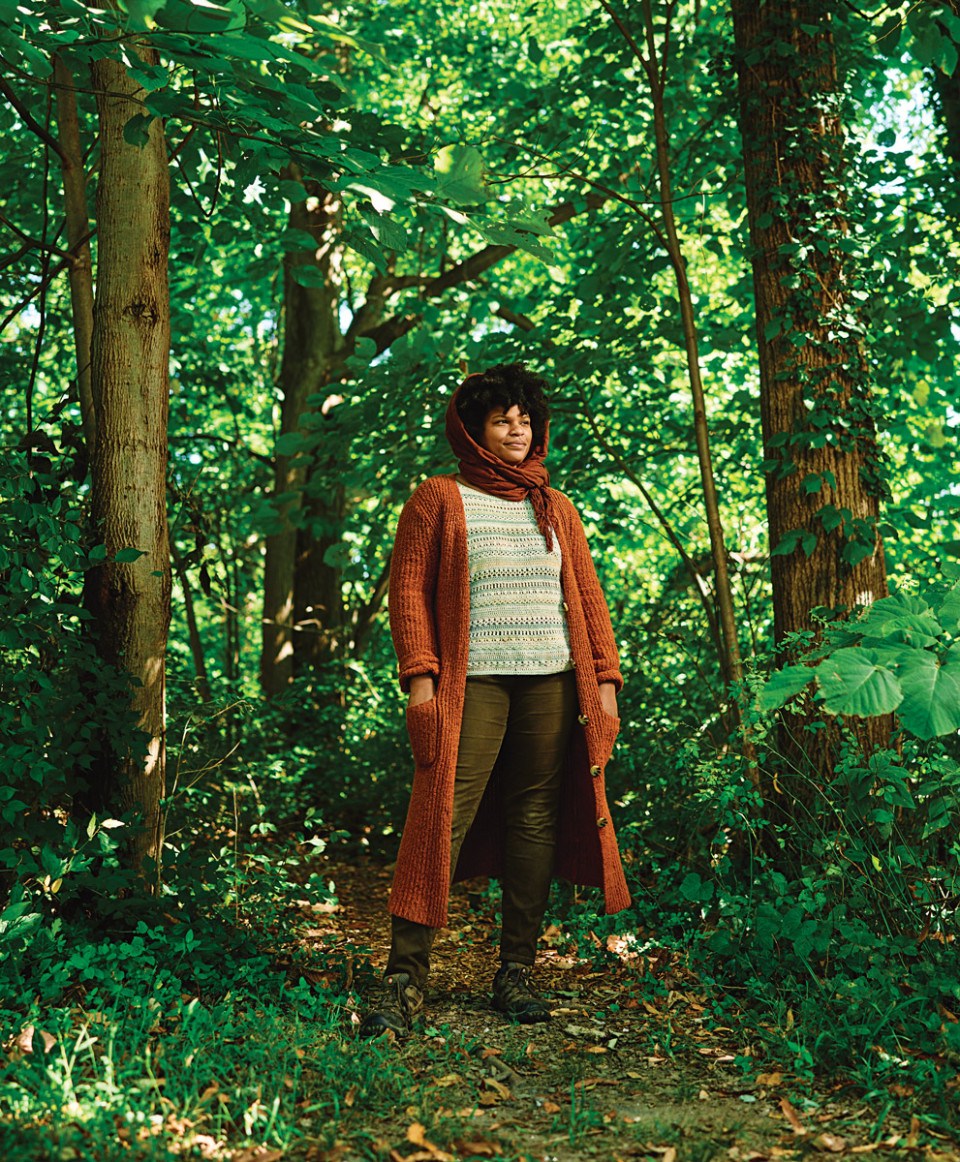
Jasmine Thompson at Awbury Arboretum
During a two-year stint in Northern California, Jasmine Thompson helped build food forests — veggie- and edible-plant-laden gardens that mimic the vertical growth of woodlands — for surrounding Indigenous tribes. When she returned home to Germantown in 2017, she knew she wanted to promote sustainable agriculture in and around Northwest Philly, so she began farming on a small plot of land at Awbury Arboretum. In March of 2020, she launched Philly Forests as an informal, free CSA.
The initial goal for Philly Forests — which officially became a business 10 months later — was to rectify community food inequalities. “Black neighborhoods are often inundated with food that’s high in salt and trans fats, which impacts people’s perception of what the food system is and who it serves,” Thompson says. “I wanted to rewrite that by increasing access to nutrient-dense food.”
Her mission evolved as the business grew. In 2021, Thompson created the Germantown Farmers Market and expanded her biz to include an urban forestry program focused on planting trees near schools, residences and churches in zip codes with low tree canopy. (The most recent assessment found that the city lost 3,075 acres of tree canopy between 2008 and 2018 — and that the canopy will continue to decline without prevention efforts.)
This past year, that reforestation service developed into an urban ecology initiative — those who couldn’t accommodate a full tree could receive shrubs or perennial flowers. “Our ecology program brings beauty to people’s blocks and contributes to urban habitat restoration — you’re greenifying the neighborhood while also inviting wildlife and helping assimilate pollinators,” Thompson says.
In the near future, Thompson wants to launch a youth training program to teach local Black teens how to pursue farming, forestry or horticulture professionally. And Philly Forests is actively looking for five to 10 acres of land on which to run their farm, a CSA, and a larger-scale ecology program.
“My work teaches me so much about life,” Thompson says. “One day while sowing seeds, I came across a hard clump of soil and applied a bit of pressure. It crumbled in my hand, perfectly coating the seeds. What a lesson: If I just give something some love, if I strive to be softer, what goodness that can bring.”
Published as “To the Root” in the 2023 issue of Be Well Philly. Request a complimentary copy here.

